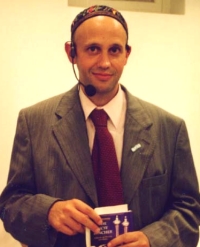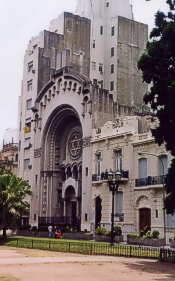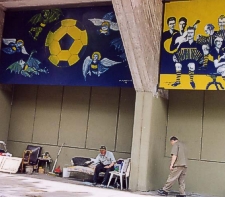
Memorial at Buenos Aires Jewish
Center that terrorists blew up killing
85 people | Cry For Your Jews, Argentina By Sally Ogle Davis and Ivor Davis
Photos by Ivor Davis  T’S a balmy night as we file into the basement social hall of the venerable Libertad Synagogue in downtown Buenos Aires. It resembles a Friday night service crowd anywhere in the U.S. T’S a balmy night as we file into the basement social hall of the venerable Libertad Synagogue in downtown Buenos Aires. It resembles a Friday night service crowd anywhere in the U.S.
The hall is packed—standing room only. An elderly man sings Yiddish songs in a still strong tenor followed by a young duo on saxophone and clarinet playing selections from Fiddler on the Roof. The crowd applauds while sipping tiny paper cups of kiddush wine. This is what they’ve come for. This and the food—especially the food. Not that it’s anything to write home about. The meal is stuffed tomato and gefilte fish—served terrine style. Dessert is ice cream straight from the carton, simple in the extreme. But there are few leftovers. When you’re hungry it all tastes good. And these people are hungry. The catastrophe that ravaged Argentina in December 2001—the peso was devalued to a third of a dollar and all savings were frozen – hit particularly hard at the middle class. Since most Argentine Jews – 80 percent live in Buenos Aires – are part of that class, they are suffering. 
Rabbi Sergei Bergman | “Fifty percent of the Jewish community are experiencing actual hunger,” George, who owns his own small electrical business and is a member of the Temple, told us. “And it’s going to get worse.” Families who had their cash in dollars in one of the many Buenos Aires banks—many of them owned by Jews—saw their savings disappear literally overnight. Dollar accounts were frozen as the peso crashed. 100,000 pesos used to be worth 100,000 dollars. Now it’s worth $27,000. As a result of the economic meltdown children can no longer afford to help their aging parents. Parents can no longer help children with their education or their housing. Since the crash some 72 welfare centers have been set up to help the beleaguered Jews in Argentina—53 of them in Buenos Aires where 80 percent of the 200,000 thousand Jews live. More than 36,000 Jews are being helped with food vouchers and subsidies to help them eat and pay medical and utility bills. The poverty lists grow by 1,500 a month. Evelyn Kollmann, a tour guide and English teacher, says her Vienna-born pensioner mother is now the “rich” member of the family by virtue of the $1, 200 she gets every month in reparations from the Austrian government. Other seniors are less fortunate. Many are trying to live on 150 pesos or $30 a month. These are the people Rabbi Sergio Bergman is entertaining at Shabbat dinner at the Libertad Synagogue. The 40-year-old rabbi looks exhausted. His well-tailored suit seems to hang on his slender frame. His eyes are blood shot. He’s too busy trying to inspire his guests to partake of the spirit of Shabbat and touch a bite of his dinner. | If You Want To Help
Contact:
 Will Recant at JDC: 212-885-0839 Will Recant at JDC: 212-885-0839
or will@jdcny.org
 The American Jewish Joint The American Jewish Joint
Distribution Committee,
711 Third Avenue,
New York NY 10017.
Phone: 212 687 6200.
Fax: 212 370 5467.
www.jdc.org. | He parades between the tables singing familiar Ashkenazi melodies. He softly cajoles the congregation to get involved in the political protests against the government’s inaction and corruption in the face of human suffering and to wear the colors of the Argentinian flag in their lapels as he does. He knows he is flying in the face of Argentine culture and tradition, he tells us. Argentina, he explains, does not have a culture of philantrophy and so neither do the Jews. “We need to teach our people to give money,” he explains sadly. “We need to teach our politicians to be mensches and not destroy this country because it’s a country with plenty of blessings, and plenty of resources. The Argentine people are the problem—our culture, our way of life.” During our two weeks in Argentina we heard the same story repeated. Populist governments from Peron on had corrupted the people by giving them handouts rather than teaching them to farm the rich land and fend for themselves. “We were all immigrants,” says Rabbi Bergman whose grandfather came from Poland, “but we have lost the values of the immigrant culture – the values of effort and work and sacrifice to make a future.” Faced with the result of that culture, those welfare centers are trying to cope with 36,000 and counting – poor Jews where once their maximum load even in the worst of times was 4,000. One third of the current caseload are children. Major aid, some $40 million, has come from the American Jewish Joint Distribution Committee (JDC) headquartered in New York, who help feed and clothe and provide medicine to the newly poor or help with Jewish day school fees. 
Temple Libertad, biggest
synagogue in Buenos Aires | The situation is dire. As we talked to people from all walks of life all over Argentina a consistent picture emerged. Once the Jewish community in Argentina was one of the wealthiest and most cultured in the world. Not any more. “It’s as bad as America was in the Great Depression,” says Steven Schwager, the JDC’s executive vice president. “In America we had Franklin Roosevelt. In Argentina the government seems incapable of dealing with the problem. For the first time in the country’s history you have a middle class who used to go to work and now they come to us for handouts.” Adds Schwager, “No one has long term solutions. It’s hard to imagine the Jews of Los Angeles, New York or Chicago going hungry like this.” Argentineans, once considered by the rest of Latin America as a proud even arrogant people who, because of their European ancestry, considered themselves a cut above the rest of the continent, have been humbled. The new Jewish poor include businessmen, and shop and factory owners who can no longer get business loans, and can’t afford to import the parts they need to carry on their businesses. Students have had to drop out of school and college to try and search for non-existent jobs to help their families. Unemployment is over 25 percent. While the old are struggling to eat, the young are leaving in droves. Argentina’s difficulties represent a potential windfall for dwindling Jewish communities all over the world who have set out to seduce young professionals to bring their education, professional skills and especially their youth to their communities. While we were in Buenos Aires, Communidades, the newspaper of Argentina’s Jewish community, ran ads offering jobs and resettlement expenses to professionals who would like to relocate to Birmingham, England. Devora, who works at AMIA Communidad Judia, the building that was blown up in l992 with 85 dead, is leaving with her computer analyst husband for Winnipeg, Canada. The folks from Winnipeg flew them out for a month and promised jobs and housing. 
Homeless man at River Plate Football
Stadium | They could have chosen Australia or New Zealand—“too far.” Barcelona where Devora’s brother lives or other countries in Latin America also beckons. European anti-Semitism, however, worries them. The irony of a community who came from Europe just like that of the U.S., now returning from whence they came, is not lost on the citizens of Buenos Aires. “Canada is a civilized country where things work," says Devora. “They want us. They will help us. And our children will have a future.” Jewish leaders tried to encourage them to make aliyah to Israel but Devora turned that option down. “Not because of the war,” she hastens to explain. She’s been to Israel and she doesn’t like it. It was too different from the laid back tempo of the Buenos Aires boulevards. “Too aggressive, too loud and rude,” she says. She was just not comfortable there. She clings to every tiny piece of good news. “This month unemployment didn’t rise,” she notes with a smile. “I have hope. Why should I leave? It would be like asking American Jews who have known only the good life to trade for some other place on the other side of the world.” Raquel visited her journalist son in Los Angeles and found the people “cold and aloof.” “And everybody works all the time,” she complains. “We love BA,” her husband George says, “ the gaiety, the smells, the life , the activity.” But they admit they are more fortunate than most. Raquel works for herself as a traveling midwife – one of only three in the city. George has his own electrical business. On their second marriage they have no children at home. They own their own home, can afford two small cars and still have an occasional dinner out or go to the theater. “But we used to save,” they say. “Now we can’t.” But they have a sense of proportion. We are at the Four Seasons in downtown Buenos Aires and they take us to the hotel window and point to a mere four blocks away where we can see a shanty town that houses the homeless who have poured into BA in search of jobs. It is a bleak picture. But for any Argentinean, however bad things get, to leave their beloved country is a wrench. Melina Fiszerman, who works for the JDC, is a parttime student in marketing and admits, “I have no future here but I will stay as long as I can. I have hope. I love this country, which is rich in resources. Why should I leave?” |